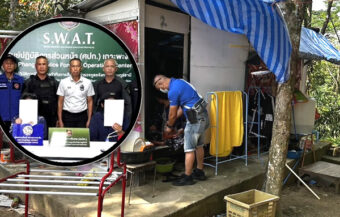Thailand has been named the 7th happiest country in the world by Ipsos, with 79% of Thais saying they feel happy or very happy. The global survey contrasts with a recent UN ranking that placed Thailand much lower at 49th, sparking debate over happiness metrics.
Thailand emerged this week as the seventh-happiest country in the world, based on what its residents said in a new survey. Conducted by IPSOS, the poll featured interviews across 30 countries and focused on people’s personal feelings, with 79% of Thais reporting they were either happy or very happy. This outcome stands in stark contrast to the United Nations World Happiness Index released in March, which ranked Thailand much lower at 49th place. However, that index has become increasingly controversial because it relies on social metrics and institutional data rather than the lived experiences and sentiments of real people. Ironically, the country the UN identifies as the happiest also reports the highest incidence of depression globally.

Thailand has been voted the seventh-happiest country in the world. This accolade comes from Ipsos, the global research company. The 2025 results were released this week. It was based on interviews with 23,765 people in 30 countries worldwide. These interviews were conducted between December 20, 2024, and January 3, 2025, targeting those under the age of 75.
Significantly, the percentage of people in Thailand who described themselves as very happy or happy was high. Indeed, this figure came in at 79%.
In contrast, only 2% of Thai people described themselves as ‘not happy at all.’ A breakdown reveals that 61% felt ‘somewhat happy’, while 18% considered themselves ‘very happy’.
Sunshine, affordability and tax policies are key reasons for Thailand’s strong happiness survey results
Certainly, there are many reasons why this may be true. Firstly, there is Thailand’s glorious sunshine. Certainly, it is a key reason many foreigners move to the kingdom. Notably, in the UN ‘Happiness Index’ revealed in March this year, Thailand was only ranked number 49.
That UN-linked index saw Thailand jump nine places, the biggest improvement in Asia. It scored 6.22 out of 10 overall. Among ASEAN peers, it came third—behind Singapore and Vietnam—but ahead of the Philippines and Malaysia.
Secondly, Thailand has had a relatively lower cost of living. For instance, the tax taken from the country’s GDP is low at only 15.5%. That’s less than half what it is in the European Union, where 40% of people’s income goes to government coffers. Then, at the same time, electricity costs and utilities are also significantly lower.
This relative affordability gives Thai citizens more personal financial control—a key driver of happiness, according to the Ipsos report. In fact, having control over one’s life ranked as one of the top three contributors to personal happiness.
Thai values, social support and community ties contrast with the UN’s more socialist metrics of happiness
Indeed, it is a paradox and a subject of debate among many commentators. Certainly, there is some doubt about the advisability of the United Nations index. For example, it measures a country’s level of corruption in addition to its government support systems. In short, it holds the more socialist state in mind as an example.
Thailand, for example, ranks 8th globally in social support despite its modest GDP per capita ranking of 81st. That contrast points to strong family and community ties as vital emotional anchors in Thai life.
In turn, this is why many nationals from top-rated Scandinavian countries choose to live in Thailand. Certainly, sometimes afterwards they began to see the advantages of the UN approach. Indeed, it is not unusual for them to return after many years in the land of smiles.
The Thai government, meanwhile, says it’s committed to raising quality of life further. It aims to enhance health care, income security and intergenerational bonds.
Thailand’s own mental health trends show clear age gaps. Gen Z males report higher happiness than females in their groups. Meanwhile, those aged 70 and above report the highest happiness levels of all.
Nordic countries score high on the UN index but suffer disproportionate depression and suicide rates
Another contradictory aspect is Finland, the country held up as the world’s happiest by the UN for eight years running. The problem is that it has had one of the world’s highest suicide rates. Certainly, across Scandinavia, the percentage of people who suffer from depression is particularly high.
For example, it is 3-5% of the population in Denmark. This is the UN’s second-happiest country. At length, Norway, which ranks 7th in the UN index, has a depression rate of 3.5%.
However, shockingly, the country which ranks highest in the UN happiness index, Finland, has a depression rate as high as 7%. This glaring contradiction continues to puzzle researchers and social commentators alike.
Certainly, a key reason for this is a lack of sunlight. It is a physical and obvious factor but one not to be underestimated.
Despite survey optimism, Thailand’s suicide rate remains the highest in ASEAN due to long-term finances
At the same time, only 2% of Thai people in the Ipsos poll released this week said they were unhappy. Despite this, the country’s suicide rate is high. It was 16.59 (per 100,000) in 2021. Subsequently, the Ministry of Public Health issued a revised figure of 7.97 in 2022. Even so, Thailand’s suicide rate remains the highest in the ASEAN bloc.
Also true is that this occurred from 2017 to 2022 when the kingdom saw a 32% rise in suicide deaths. This closely followed an economic downturn that began in 2018 and deepened through 2020.
Basically, the reason for suicide in Thailand is financial. In that period, the country began a downward economic path. Even today, in 2025, the kingdom’s chronic economic problems which emerged from 2018 to 2020 have not been remedied.
For most Thai citizens life is happy but for those struggling financially it can become a true nightmare
Therefore, you have a country suffering from economic headwinds that is essentially a happy place for most. Except for those who cannot make ends meet. Then it becomes a living nightmare.
In the meantime, the suicide rate in Finland is presently 15.3 per 100,000. This is officially two times the Thai official rate. And yet Finland continues to top the UN list.
Thailand falling in world happiness rankings, the country has fallen sharply in surveys since 2012
Thailand- the first large country with a fertility problem yet without wealth to easily fund healthcare for the old
Prime Minister welcomes news that Thai economy is the world’s happiest in Bloomberg index for a second year
At the end of the day, it appears that happiness is an elusive quality to measure and very much depends on which qualities in life are valued. Nevertheless, the Ipsos poll this week does represent what people say.
Unlike the United Nations poll in March which is based on social goals and targeted metrics. Both rankings, taken together, perhaps highlight the complexity of what makes a population feel truly content.
Join the Thai News forum, follow Thai Examiner on Facebook here
Receive all our stories as they come out on Telegram here
Follow Thai Examiner here
Further reading:
Thailand falling in world happiness rankings, the country has fallen sharply in surveys since 2012
A politically incorrect economic success: Thailand is home to some of the world’s richest people
Bright economic outlook for Thailand but the debt nightmare for poorer Thai people must be tackled
Noble spirit of Thailand’s elderly helps country deal with demographic problem
European expats moving to Thailand question UN yardsticks for quality of life


















